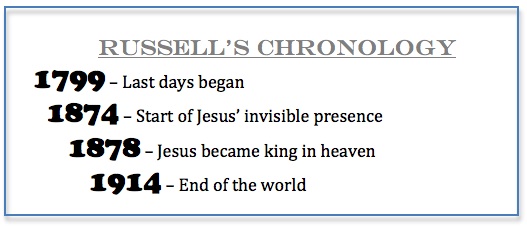So I was just comparing several quotes from different Watchtower publications related to 1914. In my experience, pre–1914 publications point to this year as the end, and post–1914 publications point to this year as the start of the last days. So I was reading Awake! from 1973 January 22 p. 8 where it claims that Jehovah's Witnesses have always pointed to year 1914 as the beginning of the last days. The evidence that I've been able to find falsifies that statement—with possibly one exception, and I'd like someone to explain this to me.
In this quote from Awake!, there's a footnote, on the same page, saying that Bible Examiner (see issue in title) supports their claim that Jehovah's Witnesses have always believed 1914 to be the start of the last days.
So I read a portion of this issue of Bible Examiner(https://ia801408.us.archive.org/30/items/1876BibleExaminer/1876_Bible_Examiner_Russell.pdf), and I think I noticed something strange about this... Bible Examiner does indeed point to 1914 as the end of the Gentile Times (as do Jehovah's Witnesses today), but it seems like Russell used this expression "the end of the Gentile Times" differently than modern JWs use it today? Today, JWs claim that the end of the Gentile Times is when Jesus takes his throne in heaven and when Satan is hurled down to earth. According to modern JWs, the end of the Gentile Times isn't the end of the last days but its beginning.
However, when you read Bible Examiner by Russell, he seems to be implying that, while the end of the Gentile Times does take place in 1914, this expression is synonymous, to him, with the expression "the end of the last days." I conclude this because of what Russell says in this issue. After pointing to 1914 as the end of the Gentile Times (like modern JWs), he then, unlike modern JWs, claims that this same year is also "[w]hen Gentile Governments shall have been dashed to pieces; when God shall have poured out of his fury upon the nation, and they acknowledge, him King of Kings and Lord of Lords." Here, Russell seems to be implying that the end of the Gentile Times is also when the Armageddon occurs.
So... My question is this. Can someone, with more knowledge about Russell, clarify this for me? If I'm correct, it seems like this is just one more example of Watchtower's dishonesty. Relying on the fact that today Jehovah's Witnesses use the expression "the end of the Gentile Times" differently than Russell, they point to this issue of Bible Examiner to support their claim. However, what they don't admit is that Russell thought the end of the Gentile Times was also when the Armageddon would occur. If I'm correct, then what this means is not only that the Watchtower is being dishonest, but that they're also committing a logical fallacy called the fallacy of equivocation.
